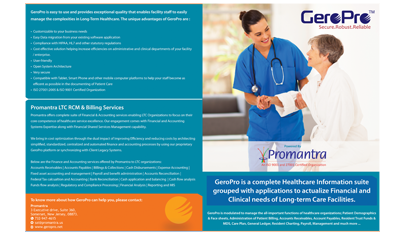Mastering Revenue Cycle Management in Skilled Nursing

Revenue Cycle Management (RCM) is essential for the financial health of Skilled Nursing Facilities (SNFs). As regulatory complexities, staffing shortages, and reimbursement delays increase, it has become crucial to optimize revenue cycles. A report from the American Health Care Association (AHCA) indicates that nearly 75% of SNFs experience cash flow issues due to inefficient billing practices, claim denials, and administrative bottlenecks. A well-managed RCM system ensures timely reimbursements, reduces claim denials, and enhances cash flow, allowing SNFs to deliver high-quality patient care without financial stress. This article will discuss key strategies for optimizing revenue cycles, best practices for minimizing claim denials, and effective methods for maintaining consistent cash flow.
1. Understanding the Revenue Cycle in Skilled Nursing
RCM in SNFs includes all financial transactions related to patient care, spanning from admission to final reimbursement. The key components are:
- Patient Pre-Admission & Eligibility Verification
- Accurate Documentation & Coding
- Claims Submission & Billing
- Reimbursement & Payment Processing
- Denials Management & Appeals
- Accounts Receivable & Collections
Each of these elements is vital for minimizing revenue loss and ensuring a seamless financial process.
2. Key Steps to Optimize Revenue Cycle Management in Skilled Nursing
2.1 Strengthening Patient Intake & Eligibility Verification
A robust revenue cycle begins with an effective pre-admission and eligibility verification process. Errors during this phase can lead to claim denials and payment delays.Challenges in Eligibility Verification:
- Incorrect insurance details
- Incomplete patient documentation
- Coverage limitations with Medicare or Medicaid
- Delayed pre-authorizations for services
Best Practices:
- Implement real-time eligibility verification systems to confirm insurance coverage prior to admission.
- Train staff to collect precise demographic and financial data.
- Utilize automated pre-authorization tools to speed up approvals for skilled nursing services.
Case Study: A Texas SNF reduced claim denials by 30% after implementing an automated eligibility verification system, allowing staff to identify insurance discrepancies before patient admission.
2.2 Enhancing Documentation & Coding Accuracy
Mistakes in medical documentation and coding are leading causes of claim denials from Medicare and Medicaid. According to the Centers for Medicare & Medicaid Services (CMS), improper coding is responsible for over 20% of rejected claims in SNFs.
Common Documentation Issues:
- Missing Physician Certifications
- Inaccurate coding for the level of care (ICD-10, CPT codes)
- Failure to justify medical necessity
Best Practices:
- Use Electronic Health Records (EHRs) integrated with coding software to minimize errors.
- Conduct regular training sessions for clinical and billing staff on coding updates.
- Leverage AI-driven documentation tools to capture real-time patient data and ensure compliance.
Expert Insight: A New York SNF experienced a 15% increase in reimbursement rates after adopting AI-driven coding software, ensuring accurate claim submissions.
2.3 Streamlining Claims Submission & Billing Processes
Prompt and accurate claim submissions are crucial for sustaining a healthy revenue cycle. Delays or mistakes in submissions can hinder revenue flow and increase administrative burdens.
Challenges in Claims Processing:
- Manual data entry errors
- Lack of standardization in billing codes
- Inconsistent payer policies
Best Practices:
- Utilize automated claims management systems to reduce errors.
- Standardize claim submission procedures across all payers.
- Implement claims tracking dashboards to monitor submission statuses and decrease processing times.
Case Study: A California SNF cut billing errors by 40% by adopting an end-to-end claims management platform, leading to faster reimbursements and fewer denied claims.
2.4 Managing Denials & Appeals Effectively
Denied claims significantly impact cash flow and escalate administrative costs. According to Becker’s Healthcare Review, 30% of denied claims are never reworked, resulting in lost revenue.
Common Reasons for Denials:
- Incomplete documentation
- Incorrect coding
- Lack of established medical necessity
- Missed filing deadlines
Best Practices:
- Use automated denial management systems to track, analyze, and appeal denied claims.
- Ensure staff are trained to submit precise claims initially to minimize rework.
- Create a dedicated denial management team to expedite appeals.
Industry Trend: SNFs employing AI-driven denial management tools have observed a 25% increase in successful claim appeals within six months of implementation.
2.5 Optimizing Accounts Receivable (AR) & Cash Flow Management
Effective management of accounts receivable ensures that SNFs receive timely payments, alleviating financial stress. Many facilities face challenges with aging AR due to delayed payments from insurers and patients.Challenges in AR Management:
- Long reimbursement cycles (30-90 days)
- High outstanding balances from Medicare/Medicaid
- Insufficient follow-up on unpaid claims
Best Practices:
- Utilize predictive analytics to identify slow-paying accounts and take proactive measures.
- Set up automated payment reminders for insurers and private payers.
- Offer flexible payment plans for patients to enhance collection rates.
Case Study: A Midwest SNF reduced outstanding AR by 35% by implementing automated payment follow-ups and offering digital payment options for patients and families.
3. Technology’s Role in Revenue Cycle Optimization
The integration of technology is vital for automating and enhancing RCM in skilled nursing facilities.Key Technological Innovations in RCM:
- AI-powered Billing Platforms: Reduce claim errors and automate submissions.
- Machine Learning for Denial Prediction: Identifies high-risk claims before submission.
- Blockchain for Transparent Transactions: Improves billing accuracy and security.
- Robotic Process Automation (RPA): Automates repetitive tasks in patient billing and claims management.
Industry Insight: A 2024 HIMSS survey found that SNFs utilizing AI-driven RCM solutions experienced a 20% reduction in administrative workload and a 15% increase in revenue capture.
4. Future Trends in Skilled Nursing Revenue Cycle Management
The RCM landscape is evolving, with value-based payment models and telehealth reimbursements shaping future strategies.Emerging Trends:
- Shift to Value-Based Care (VBC): Medicare’s transition to outcome-based reimbursement models will necessitate enhanced quality reporting and improved patient outcomes from SNFs.
- Increased Medicaid Funding & Alternative Payment Models: States are expanding Medicaid reimbursements, presenting new revenue opportunities for SNFs.
- Integration of Interoperable EHRs: Ensuring seamless data sharing between SNFs, hospitals, and insurers to facilitate quicker reimbursement.
Outlook: By 2027, over 50% of SNFs are expected to adopt real-time RCM solutions, significantly reducing claim denials and bolstering financial sustainability.
Conclusion: Strengthening Financial Health through Optimized RCM
To master Revenue Cycle Management in Skilled Nursing Facilities, a strategic approach is needed, encompassing:
- Accurate pre-admission screening to avoid eligibility issues.
- Seamless documentation and coding to reduce claim denials.
- Efficient claims submission and denial management for timely payments.
- Advanced technology adoption to automate financial workflows.
By implementing the best practices and embracing innovative technology, SNFs can optimize their revenue cycles, eliminate financial bottlenecks, and secure steady cash flow for long-term financial stability.
A perfect fit for Skilled Nursing Facilities, Assisted Living Facilities, Home Health, Hospice and Other Day Care Centres.
Download BrochureRequest a demo


























